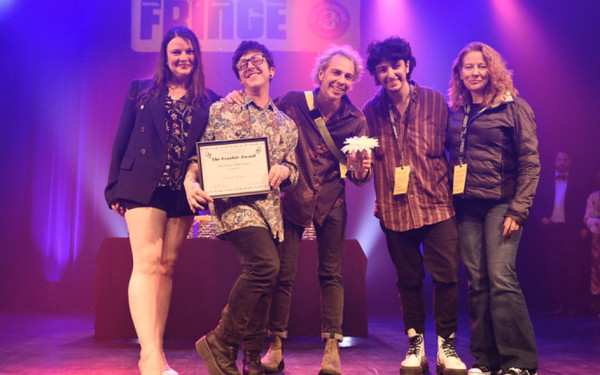Growing Up in an Abusive Immigrant Family
Pluk’d Brings Themes of Culture, Generation and Language Gaps to Fringe Festival
Children and parents often don’t see eye to eye. But for second-generation immigrant youth, the generational gap looks more like a tectonic rift.
If you grew up in the West and your parents didn’t, then Pluck’d will undoubtedly hit close to home—or quite simply at home.
“[Immigrant parents] won’t understand the person or identity you’ve created for yourself in North America,” said Mercedeh Baroque, acting as Cheeri, the child in the play. “Either you’re completely traditional and you’re like your parents’ generation who came over, or you’re completely assimilated and white-washed.”
Pluck’d, a play by Bald Angry Asian Productions, is a reflection of Concordia University undergrad and playwright Kě Xīn Li’s personal experience.
The play hones in on an episode during Christmas dinner as Cheeri, a queer, transgendered anarchist, comes home after their first year in university, revealing the Chinese immigrant family’s diverging values.
The Father, played by Edward Wong, is not having any of it and struggles in his attempt to explain to Cheeri that his values are superior.
“My parents wanted me to become a doctor, lawyer or an accountant,” shared Li. “You don’t realize that because of their immigrant struggle, they moved here because they want you to have more opportunities in life.”
Unfortunately, sometimes disagreements are met with violence as the audiences will witness during the play.
“My parents weren’t bad people,” Li said. “They just invested everything into me and now I’m something that’s incomprehensible to them.”
Immigrant parents will often have a hard time understanding that their children are exposed to a culture that is largely centered on the freedom of expression and self-fulfillment.
“There’s no space […] for us to explore the values we absorb from our parents and the values we absorb from [the West],” said Baroque. “It causes that rift in understanding and communication.”
Language barriers are a strong factor when talking about complex ideas. In many cases, conversation won’t go further than, “small talk and weather,” as Li explained.
The Mother played by Kayo Yasuhara is submissive to her husband, to the point that the character is a clown that mimes the entire time. It’s also symbolic of the linguistic barrier.
Having spent their childhood with limited conversational engagement, second-generation immigrants end up at an oral disadvantage when confronted with social, professional and intimate relationships during adulthood. Li also feels that this reality can create envy in immigrant youth towards their Caucasian peers.
“I have these white friends whose parents use the proper pronouns for them,” said Li. “[They] understand and fully comprehend their gender identity, their queer identity, their politics or ideology.”
Pluck’d // St. Ambroise Fringe Festival // June 8 – 17 // MainLine Theatre (3997 St. Laurent Blvd) // $10 for general admission OR PWYC // montrealfringe.ca

_900_600_90.jpg)


